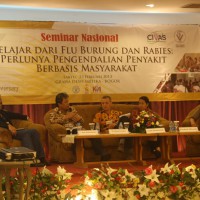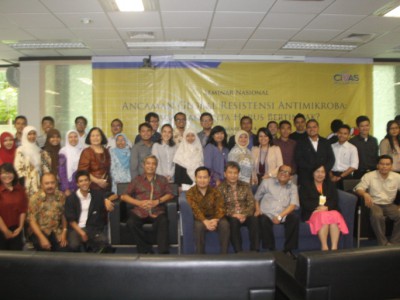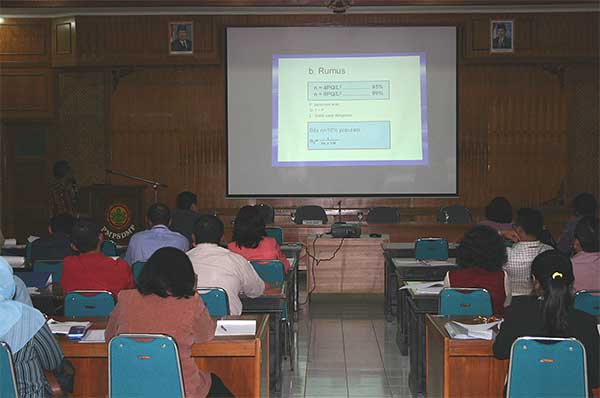Vaccination and Sampling Method Training for Avian Influenza Diagnosis
Wednesday, 21 June 2006
To support the Field Trial Vaccination program in Sukabumi district which is a collaboration between Center for Indonesian Veterinary Analytical Studies (CIVAS) and Wageningen International, on June 21st – 22nd, 2006 a “Vaccination and Sampling Method Training for Avian Influenza Diagnosis was held. The objectives of this training was to provide reviews on various information, to provide the right knowledge and practical skills for conducting vaccination and sample collecting in the field which is all in preparations for the vaccination and sampling program for Avian Influenza diagnosis. The training which lasted for two days was held at Cinagara Agribusiness Education and Training Office of Animal Husbandry and Health, Cinagara – Bogor. Twenty three (23) participants attended this training. The training participants were representatives from the District Livestock Services Office of Sukabumi, Veterinary Public Health and Animal Disease Investigation Laboratory (Cikole – Lembang), PT. Medion and CIVAS.
The training was officially opened on June 21st, 2006 by the Head of District Livestock Services Office of Sukabumi, who was represented by the Head of Animal Health Sub Division, drh. Winda Sri Rahayu Kamal. The opening ceremony which started at 11.00 WIB was attended by the Executive Director of CIVAS, drh. Albertus Teguh Muljono and representatives from Wageningen International, Mr. Arend Jan Nell and Mr. Teun Fabri, who also delivered opening remarks. Also attending the training was the head of Veterinary Public Health and Animal Disease Investigation Laboratory (Cikole – Lembang), drh. Sri Mudjiartiningsih.
 The training material consists of two main subjects, which are Vaccination and Sampling Methods. The material about Vaccination was presented by Dr. drh. Retno D. Soejoedono, MS from the Immunology Laboratory, Faculty of Veterinary Medicine, Bogor Agricultural Institute. She delivered some main subjects which are: Factors Influencing the Success of Vaccination, Vaccine Handling and Vaccination Methods. Drh. Sri Murtini, MSi – teaching staff from Microbiology Division, Department of Animal Disease and Veterinary Public Health, Faculty of Veterinary Medicine, Bogor Agricultural Institute – delivered materials regarding Sampling Methods, which comprises of some main subjects which are: Sampling Preparations, Sample Transport Media, Sampling Methods, Sample Handling and Sample Transportation. These materials were presented on the first day of training. After material presentation by the instructors, Mr. Arend Jan Nell guided the participants to review those materials in the form of discussion.
The training material consists of two main subjects, which are Vaccination and Sampling Methods. The material about Vaccination was presented by Dr. drh. Retno D. Soejoedono, MS from the Immunology Laboratory, Faculty of Veterinary Medicine, Bogor Agricultural Institute. She delivered some main subjects which are: Factors Influencing the Success of Vaccination, Vaccine Handling and Vaccination Methods. Drh. Sri Murtini, MSi – teaching staff from Microbiology Division, Department of Animal Disease and Veterinary Public Health, Faculty of Veterinary Medicine, Bogor Agricultural Institute – delivered materials regarding Sampling Methods, which comprises of some main subjects which are: Sampling Preparations, Sample Transport Media, Sampling Methods, Sample Handling and Sample Transportation. These materials were presented on the first day of training. After material presentation by the instructors, Mr. Arend Jan Nell guided the participants to review those materials in the form of discussion.
On the second day of training, vaccination and sampling practices were performed on chickens which were already provided in cages at the training location. Based on the theory received, participants were encouraged to practice the steps in vaccination and sampling as if they were actually conducting it at field. Starting from preparation of equipment, preparing themselves, performing vaccination, collecting blood samples, cloacal swabs and tracheal swabs, until cleaning equipment and themselves after conducting vaccination and sampling activities. This practice was constantly assisted by the instructors and Mr. Arend Jan Nell and Mr. Teun Fabri.
On the second day of training, Mr. Teun Fabri delivered a presentation about Avian Influenza and was continued with a discussion session. The next discussion was chaired by Mr. Arend Jan Nell which the main task was to create a matrix of problems and solutions based on of each training participant’s experience in performing vaccination and sampling programs at field.
The training program was ended by a closing ceremony at 17.00 WIB on June 22nd, 2006. This event was closed by a speech from Mr. Arend Jan Nell and was continued by drh. Albertus Teguh Muljono who also delivered a speech and officially closed the training. The organizing committee of Vaccination and Sampling Method Training hopes that this event was beneficial and could really be implemented at field. ***











